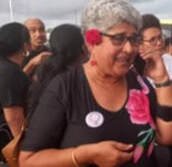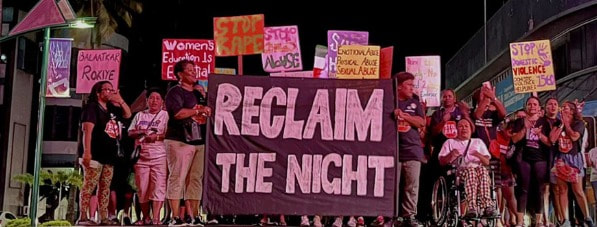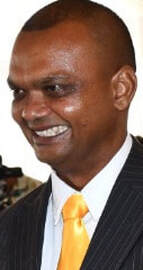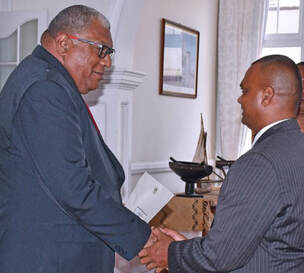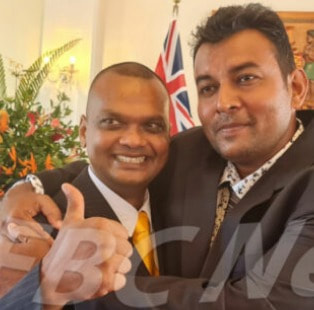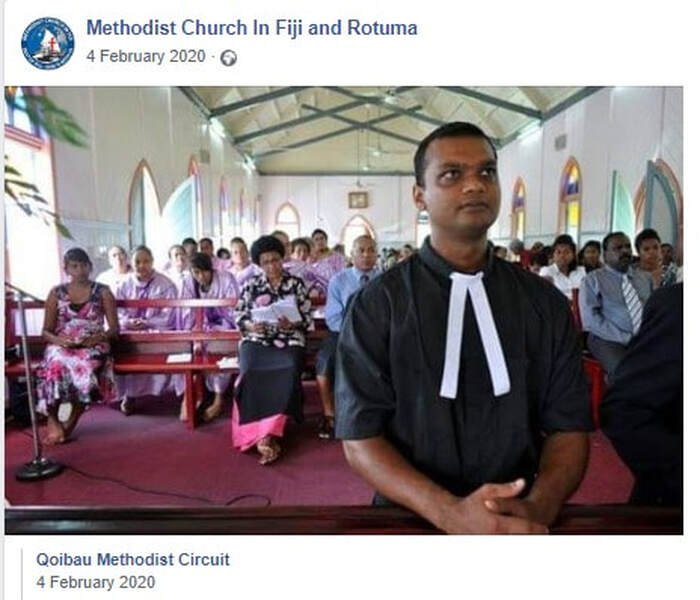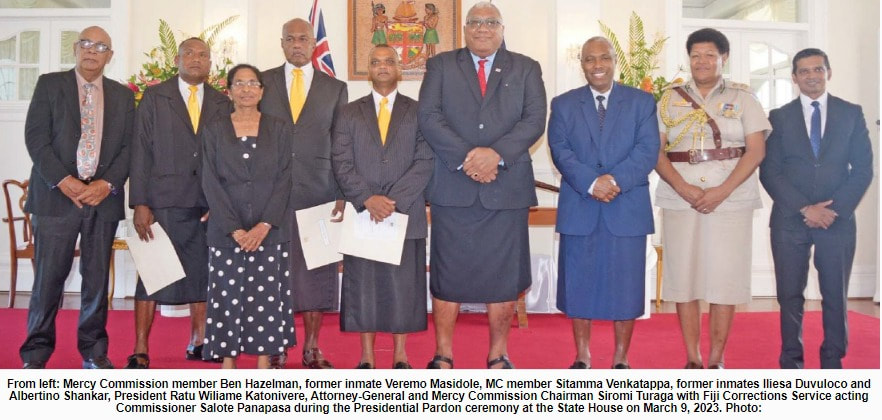Chants of safe homes, streets, taxis, nightclubs, supermarkets, ending violence and rape against women and children echoed in Suva this week as hundreds took part in the Reclaim The Night March
*Fijileaks: Albertino Shankar, among the first three to be pardoned since Rabuka's Coalition came to power, featured prominently in all the news media outlets, including on the Fiji Government Facebook page. But none of them informed us what was Shankar's crime that he was locked up behind bars. From our research, we found that he, and an accomplice, were jailed on 4 July 2003 by the former Chief Justice Anthony Gates for raping and murdering a Chinese woman in her own flat.
"This was, as I said in summing up the case, a truly dreadful crime. A 34 year old Chinese lady, a Ms Tang, living alone in a flat awakens to find two men entering through her bedroom window after midnight. |
But to avoid any struggling and any chance of Ms Tang shouting out for help, before each raped her a second time, they taped her ankles with scotch tape or masking tape and bound up most of her face with tape, and tied her hands behind her back with wire.
All of this account comes from the prisoners’ own admissions made to the police. The Accused then discussed in front of Ms Tang what they were going to do with her. Though there was some initial reluctance on the part of Francis, both agreed eventually that she would have to be killed because she would recognise them again. It is likely she knew Albertino as a person who lived downstairs at the same block of flats.
Albertino brought a piece of rope from another room wound it several times around the victim’s neck, and strangled her. Francis held her legs. She struggled, until she ceased breathing and died.
Just prior to the strangling, no doubt realising what the 2 Accused were deciding to do with her, Ms Tang kept pleading with them "I don’t want to die. I don’t want to die." It is not difficult to imagine the horrific ordeal that faced the victim in her final moments.
Her life was taken with hardly a thought, ruthlessly, callously.
Justice Anthony Gates, 4 July 2003
SENTENCE: Justice Anthony Gates
[1] Albertino Shankar and Francis Narayan you have been found guilty by the court of the offence of murder. The sentence fixed by law for such an offence is that the convicted person shall be sentenced to imprisonment for life. There is no discretion allowed to the court in a murder case to sentence to a lesser term.
[2] It is well known that convicted persons sentenced to life imprisonment usually do not serve the full term, that is serve imprisonment for the rest of their lives. Most have their sentences reduced after serving a considerable term such as 10 or 12 years.
[3] In this case I had called for submissions from counsel on whether I should recommend a minimum period to be served under the provisions of section 33 of the Penal Code.
[4] Ms Narayan, submitting for both prisoners, informs me that the actual period of imprisonment is usually 14 years, but that the latter part is allowed to be served in the community outside of the prison walls.
[5] It is significant here that the prisoners were very young when they committed this offence. Albertino was aged 17 years 9 months. He is now 20. Francis was aged 21 at the time, and he is now 23. I keep in mind their youth.
[6] They are not from well off homes. They did not get far with their education. Albertino appears to have drifted between a home with his single mother and a home with his elderly grandfather. Francis’ home appears more stable, yet he got involved in an offence of bulk store breaking in 1999 and served a term of imprisonment of 9 months. Albertino has not previously been before the courts.
[7] Both have had casual work, but nothing of permanence or promise.
[8] Neither has shown any remorse for what they have done. Both maintain their innocence. But both were emotionally moved when asked if they had anything to say prior to sentence and in addressing the court.
[9] Mr Rabuku has made no submissions on behalf of the State on the question of whether there should be a recommendation of minimum service. Ms Narayan says the recommendation should be of 5 years only, since they have been on remand now for 2 years 3 months, equivalent to a full term of 3 years 9 months.
[10] I take that period of remand into account when arriving at the appropriate order.
[11] This was, as I said in summing up the case, a truly dreadful crime. A 34 year old Chinese lady, a Ms Tang, living alone in a flat awakens to find two men entering through her bedroom window after midnight.
[12] According to the Accused, their plan was to steal from Ms Tang. They did eventually do just that, and this might have remained a case of house breaking. But the two Accused, commencing with Albertino, then raped Ms Tang. Francis followed after and raped her also. Each Accused raped her for a second time whilst they remained in the flat. They are not charged with rape, but I take what they said they did into account as an aggravating feature of this murder case.
[13] But to avoid any struggling and any chance of Ms Tang shouting out for help, before each raped her a second time, they taped her ankles with scotch tape or masking tape and bound up most of her face with tape, and tied her hands behind her back with wire.
[14] All of this account comes from the prisoners’ own admissions made to the police. The Accused then discussed in front of Ms Tang what they were going to do with her. Though there was some initial reluctance on the part of Francis, both agreed eventually that she would have to be killed because she would recognise them again. It is likely she knew Albertino as a person who lived downstairs at the same block of flats.
[15] Albertino brought a piece of rope from another room wound it several times around the victim’s neck, and strangled her. Francis held her legs. She struggled, until she ceased breathing and died.
[16] Just prior to the strangling, no doubt realising what the 2 Accused were deciding to do with her, Ms Tang kept pleading with them "I don’t want to die. I don’t want to die." It is not difficult to imagine the horrific ordeal that faced the victim in her final moments.
[17] Her life was taken with hardly a thought, ruthlessly, callously.
[18] The defence at one point appeared to hint at responsibility for the crime lying with one of Ms Tang’s friends.
[19] The inhabitants of Fiji must be made to feel secure in their homes. They should be able "to sleep easily", to feel secure. Housebreakers are to be deterred or at least punished. Housebreakers who go on to commit rape on the occupants, need even more severe punishment. To those who having committed those two serious crimes, go on to destroy the evidence, and to murder the occupants can expect no mercy from the courts. The courts have a duty to inflict condign punishment.
[20] But I have arrived at a recommendation for a minimum term to be served that will not destroy your lives. It will allow some hope for a fresh start when you are released. It is to be hoped that when that time comes you will indeed be able to start afresh and to make something of your lives.
[21] Accordingly you are both sentenced to life imprisonment and I recommend that you each serve a minimum term of 17 years imprisonment.
[1] Albertino Shankar and Francis Narayan you have been found guilty by the court of the offence of murder. The sentence fixed by law for such an offence is that the convicted person shall be sentenced to imprisonment for life. There is no discretion allowed to the court in a murder case to sentence to a lesser term.
[2] It is well known that convicted persons sentenced to life imprisonment usually do not serve the full term, that is serve imprisonment for the rest of their lives. Most have their sentences reduced after serving a considerable term such as 10 or 12 years.
[3] In this case I had called for submissions from counsel on whether I should recommend a minimum period to be served under the provisions of section 33 of the Penal Code.
[4] Ms Narayan, submitting for both prisoners, informs me that the actual period of imprisonment is usually 14 years, but that the latter part is allowed to be served in the community outside of the prison walls.
[5] It is significant here that the prisoners were very young when they committed this offence. Albertino was aged 17 years 9 months. He is now 20. Francis was aged 21 at the time, and he is now 23. I keep in mind their youth.
[6] They are not from well off homes. They did not get far with their education. Albertino appears to have drifted between a home with his single mother and a home with his elderly grandfather. Francis’ home appears more stable, yet he got involved in an offence of bulk store breaking in 1999 and served a term of imprisonment of 9 months. Albertino has not previously been before the courts.
[7] Both have had casual work, but nothing of permanence or promise.
[8] Neither has shown any remorse for what they have done. Both maintain their innocence. But both were emotionally moved when asked if they had anything to say prior to sentence and in addressing the court.
[9] Mr Rabuku has made no submissions on behalf of the State on the question of whether there should be a recommendation of minimum service. Ms Narayan says the recommendation should be of 5 years only, since they have been on remand now for 2 years 3 months, equivalent to a full term of 3 years 9 months.
[10] I take that period of remand into account when arriving at the appropriate order.
[11] This was, as I said in summing up the case, a truly dreadful crime. A 34 year old Chinese lady, a Ms Tang, living alone in a flat awakens to find two men entering through her bedroom window after midnight.
[12] According to the Accused, their plan was to steal from Ms Tang. They did eventually do just that, and this might have remained a case of house breaking. But the two Accused, commencing with Albertino, then raped Ms Tang. Francis followed after and raped her also. Each Accused raped her for a second time whilst they remained in the flat. They are not charged with rape, but I take what they said they did into account as an aggravating feature of this murder case.
[13] But to avoid any struggling and any chance of Ms Tang shouting out for help, before each raped her a second time, they taped her ankles with scotch tape or masking tape and bound up most of her face with tape, and tied her hands behind her back with wire.
[14] All of this account comes from the prisoners’ own admissions made to the police. The Accused then discussed in front of Ms Tang what they were going to do with her. Though there was some initial reluctance on the part of Francis, both agreed eventually that she would have to be killed because she would recognise them again. It is likely she knew Albertino as a person who lived downstairs at the same block of flats.
[15] Albertino brought a piece of rope from another room wound it several times around the victim’s neck, and strangled her. Francis held her legs. She struggled, until she ceased breathing and died.
[16] Just prior to the strangling, no doubt realising what the 2 Accused were deciding to do with her, Ms Tang kept pleading with them "I don’t want to die. I don’t want to die." It is not difficult to imagine the horrific ordeal that faced the victim in her final moments.
[17] Her life was taken with hardly a thought, ruthlessly, callously.
[18] The defence at one point appeared to hint at responsibility for the crime lying with one of Ms Tang’s friends.
[19] The inhabitants of Fiji must be made to feel secure in their homes. They should be able "to sleep easily", to feel secure. Housebreakers are to be deterred or at least punished. Housebreakers who go on to commit rape on the occupants, need even more severe punishment. To those who having committed those two serious crimes, go on to destroy the evidence, and to murder the occupants can expect no mercy from the courts. The courts have a duty to inflict condign punishment.
[20] But I have arrived at a recommendation for a minimum term to be served that will not destroy your lives. It will allow some hope for a fresh start when you are released. It is to be hoped that when that time comes you will indeed be able to start afresh and to make something of your lives.
[21] Accordingly you are both sentenced to life imprisonment and I recommend that you each serve a minimum term of 17 years imprisonment.
REVELATION: Let us hope that Shankar has really found the calling of God in Prison. Otherwise, we could say with Revelation 21:8
"But as for the cowardly, the faithless, the detestable, as for murderers, the sexually immoral, sorcerers, idolaters, and all liars, their portion will be in the lake that burns with fire and sulfur, which is the second death.”
Inmate Albertino Shankar is now a newly-inducted Methodist Church pastor.
A man convicted for murder has taken on a new conviction - to be Christ-like.
Albertino Shankar was yesterday inducted by the head of the Methodist Church's Indian division, Reverend William Lucas, as a lay preacher or vakatawa.
It's been 10 years since the 28-year old was sentenced to prison for murder.
Shankar spent three years studying to be a preacher and in August last year, passed his final exam with flying colours.
Mr Lucas described the induction as historical for the Dilkusha Circuit and paid tribute to those involved in the prison ministry.
"Sometimes we don't see that as important but this is the result of the message that has been shared there (prison)," he said.
"The mission of the church is to save souls and we should look at people with compassion and love so that they know that our God is a loving and forgiving God."
Shankar said becoming a preacher was far from his mind and not his will.
"Everything we plan gets diverted by God," he said.
"Whatever He wills for everyone is the best."
Shankar was not a Christian, in fact, he only heard of the Bible while in prison.
Reverend Anil Reuben was in charge of the prison ministry with Dilkusha Methodist Church.
He said from 2003 to 2008, 16 prisoners from the Nasinu prison were baptised.
"I baptised Albertino in 2004," he said. "The baptism was done in the little river in Nasinu, which they now use for duck farming."
Mr Reuben said since then, Shankar has taken a keen interest in the faith.
Shankar said it was through the prison ministry program that he confessed to past mistakes.
"I then began to pray for myself and for others," he said. "I have seen those prayers come to pass and that's what convinced me to change."
Shankar said it took commitment and sacrifice to become a preacher.
"I spent a lot of sleepless nights studying," he said.
"The Bible concludes to one word - love.
"The more we love each other the more we will see God in our midst and all He wants is to be in our midst."
Shankar said he would participate in pre-release program at Nasinu Prison but said he had not yet applied for his release.
"I prefer to get into the prison ministry from outside," he said.
"It's difficult to penetrate from the inside and easier from outside.
"I believe that through prayer every barrier can be broken, all it takes is commitment."
Following his induction, Shankar thanked the congregation for welcoming him, saying it was the first time for him to step into a church.
"It's warm and beautiful," he said of the atmosphere.
"Every love that God showed Timothy, I feel here today.
"I won't say I am there, I'm on my way."
Shankar plans to pursue studies to become a church minister.
Source: The Fiji Times 23 Jan 2012
A man convicted for murder has taken on a new conviction - to be Christ-like.
Albertino Shankar was yesterday inducted by the head of the Methodist Church's Indian division, Reverend William Lucas, as a lay preacher or vakatawa.
It's been 10 years since the 28-year old was sentenced to prison for murder.
Shankar spent three years studying to be a preacher and in August last year, passed his final exam with flying colours.
Mr Lucas described the induction as historical for the Dilkusha Circuit and paid tribute to those involved in the prison ministry.
"Sometimes we don't see that as important but this is the result of the message that has been shared there (prison)," he said.
"The mission of the church is to save souls and we should look at people with compassion and love so that they know that our God is a loving and forgiving God."
Shankar said becoming a preacher was far from his mind and not his will.
"Everything we plan gets diverted by God," he said.
"Whatever He wills for everyone is the best."
Shankar was not a Christian, in fact, he only heard of the Bible while in prison.
Reverend Anil Reuben was in charge of the prison ministry with Dilkusha Methodist Church.
He said from 2003 to 2008, 16 prisoners from the Nasinu prison were baptised.
"I baptised Albertino in 2004," he said. "The baptism was done in the little river in Nasinu, which they now use for duck farming."
Mr Reuben said since then, Shankar has taken a keen interest in the faith.
Shankar said it was through the prison ministry program that he confessed to past mistakes.
"I then began to pray for myself and for others," he said. "I have seen those prayers come to pass and that's what convinced me to change."
Shankar said it took commitment and sacrifice to become a preacher.
"I spent a lot of sleepless nights studying," he said.
"The Bible concludes to one word - love.
"The more we love each other the more we will see God in our midst and all He wants is to be in our midst."
Shankar said he would participate in pre-release program at Nasinu Prison but said he had not yet applied for his release.
"I prefer to get into the prison ministry from outside," he said.
"It's difficult to penetrate from the inside and easier from outside.
"I believe that through prayer every barrier can be broken, all it takes is commitment."
Following his induction, Shankar thanked the congregation for welcoming him, saying it was the first time for him to step into a church.
"It's warm and beautiful," he said of the atmosphere.
"Every love that God showed Timothy, I feel here today.
"I won't say I am there, I'm on my way."
Shankar plans to pursue studies to become a church minister.
Source: The Fiji Times 23 Jan 2012
THREE ex-offenders were granted Presidential Pardon by His Excellency, the President Ratu Wiliame Katonivere at the State House today.
Mr. Albertino Shankar
Mr. Iliesa Duvuloco
Mr. Veremo Peceli Masidole
In his address at the ceremony, President Katonivere highlighted that the grant of Presidential pardon is made possible by the guidance and advice of the Mercy Commission, which exists by virtue of section 119 of the Constitution of the Republic of Fiji.
“On the petition of any convicted person, the Commission may recommend that the President exercise a power of mercy by either granting a free or conditional pardon; postponing the carrying out of a punishment, whether for a specific or indeterminate period; or by remitting all or part of a punishment.”
“The process begins when there is an application of pardon made to the Chairperson of the Mercy Commission.”
President Katonivere highlighted that his primary concern is also the motto of the office that he holds which must always be the pillar of national unity by carrying out his duty keeping in mind the greatest good of all the people of Fiji.
“As a citizen, a traditional chief and a father and grandfather, my first concern is to be true to my own convictions and my own conscience.”
“To the Pardonees, on behalf of all Fijians, I welcome you back into society with the trust that you will treasure this moment and this act of forgiveness. I hope that today’s public Grant of Presidential Pardon shall be the catalyst for reconciliation, national progress and healing.”
President Katonivere further outlined that the grant of pardon ceremony is to show acceptance from the society and all citizens of Fiji, as our Pardonees have served their time.
“The programmes carried out by the Fiji Corrections Services to up skill an incarcerated person so they come out with skills that they will be able to utilise in order to assist them and their families livelihoods through the Yellow-Ribbon programme is applauded.”
Present at the event was the Attorney-General Siromi Turaga Acting Chief Justice Mr Salesi Temo, Acting commissioner for Fiji Corrections Service Mrs Salote Panapasa, members of the Mercy Commission and senior officers of the Fiji Corrections Services.
Mr. Albertino Shankar
Mr. Iliesa Duvuloco
Mr. Veremo Peceli Masidole
In his address at the ceremony, President Katonivere highlighted that the grant of Presidential pardon is made possible by the guidance and advice of the Mercy Commission, which exists by virtue of section 119 of the Constitution of the Republic of Fiji.
“On the petition of any convicted person, the Commission may recommend that the President exercise a power of mercy by either granting a free or conditional pardon; postponing the carrying out of a punishment, whether for a specific or indeterminate period; or by remitting all or part of a punishment.”
“The process begins when there is an application of pardon made to the Chairperson of the Mercy Commission.”
President Katonivere highlighted that his primary concern is also the motto of the office that he holds which must always be the pillar of national unity by carrying out his duty keeping in mind the greatest good of all the people of Fiji.
“As a citizen, a traditional chief and a father and grandfather, my first concern is to be true to my own convictions and my own conscience.”
“To the Pardonees, on behalf of all Fijians, I welcome you back into society with the trust that you will treasure this moment and this act of forgiveness. I hope that today’s public Grant of Presidential Pardon shall be the catalyst for reconciliation, national progress and healing.”
President Katonivere further outlined that the grant of pardon ceremony is to show acceptance from the society and all citizens of Fiji, as our Pardonees have served their time.
“The programmes carried out by the Fiji Corrections Services to up skill an incarcerated person so they come out with skills that they will be able to utilise in order to assist them and their families livelihoods through the Yellow-Ribbon programme is applauded.”
Present at the event was the Attorney-General Siromi Turaga Acting Chief Justice Mr Salesi Temo, Acting commissioner for Fiji Corrections Service Mrs Salote Panapasa, members of the Mercy Commission and senior officers of the Fiji Corrections Services.
